iPhone 16 Plus Details
Apple's iPhone 16 Plus is now available, and it's the company's most affordable large-sized iPhone yet.
Now you can get a big-screen iPhone with upgraded specs, a new Action button and Camera Control button, some subtle design changes, and more power. It's ready for Apple's AI features when they roll out. Apple's upcoming suite of AI features was touted as the main upgrade that differentiates the iPhone 16 Plus and other versions from the iPhone 15 line last year.
iPhone 16 Plus release date
The iPhone 16 Plus starts at $899. The iPhone 16 Plus will officially be released on September 20. Before that, users can pre-order from Friday, September 13.
However, the launch dates of some iPhone 16 Plus configurations have now been pushed back, which makes sense, as the iPhone 16 Plus is said to be much more popular than its predecessor when it launched.
The iPhone 16 Plus launches at the same price as its predecessor, the iPhone 15 Plus. Here's a full breakdown of the iPhone 16 Plus' pricing based on its specs:
| Memory | Selling price |
| 128GB | $899 |
| 256GB | $999 |
| 512GB | $1199 |
Specifications
| Size | 160.9mm x 77.8mm x 7.80mm |
| Weight | 199g |
| Screen | 6.7-inch Super Retina XDR OLED |
| Resolution | 2796 x 1290 |
| Pixel density | 460ppi |
| Refresh rate | 60hz |
| Chipset | A18 |
| Rear camera | 48MP main camera (26mm, ƒ/1.6), 12MP ultra-wide camera (13mm, ƒ/2.2) |
| Front camera | 12MP (ƒ/1.9) |
| Operating system | iOS 18 |
| Memory | 128GB, 256GB, 512GB |
| Battery life | Up to 27 hours of video playback or 100 hours of audio playback |
| Charging | 45W wired charging, 25W MagSafe wireless charging, 7.5W Qi wireless charging |
Camera Control takes control
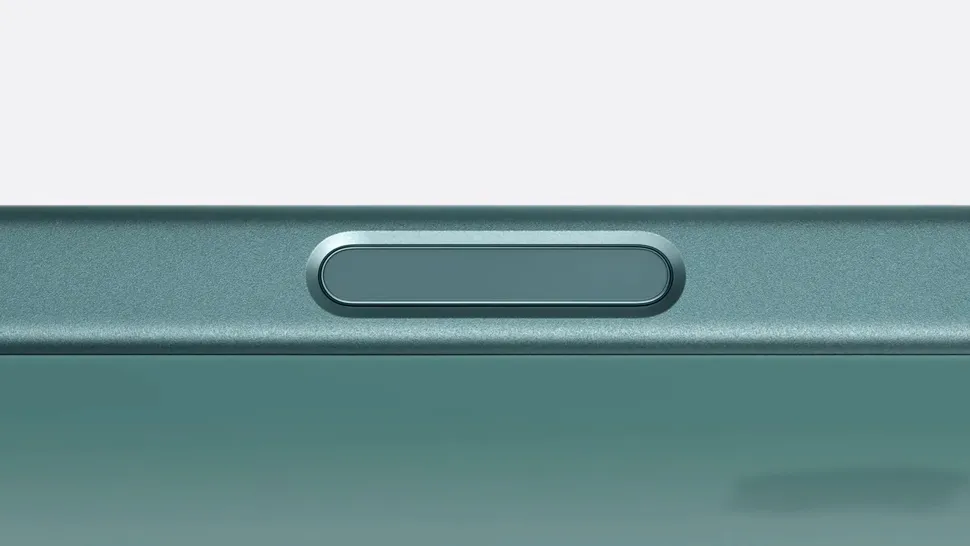
- The Camera Control button gives the camera app a button that can do more than just take a photo.
- This all-new button is available on all iPhone 16 models.
- Combines touch buttons and haptic feedback, and detects touch gestures
The iPhone 16 Plus, like the rest of the iPhone 16 lineup, comes standard with an all-new Camera Control button. Camera Control is a touch-sensitive button that also senses touch input via a capacitive surface, allowing clicks, taps, swipes, and double-taps to perform a full range of camera functions, including clicking the button to open the camera app, swiping to zoom in and out, and tapping to access more options.
The feel of the physical button is enhanced by Apple's Taptic Engine, providing additional haptic feedback. Camera Control also ties into Visual Intelligence, itself part of Apple's AI toolkit. Visual Intelligence uses the camera to identify and provide contextual information about objects in the user's environment.
For example, pointing the camera at a dog and activating Visual Intelligence will display information about that dog breed from the Internet, a similar premise to Google Lens.
Action Button is here!
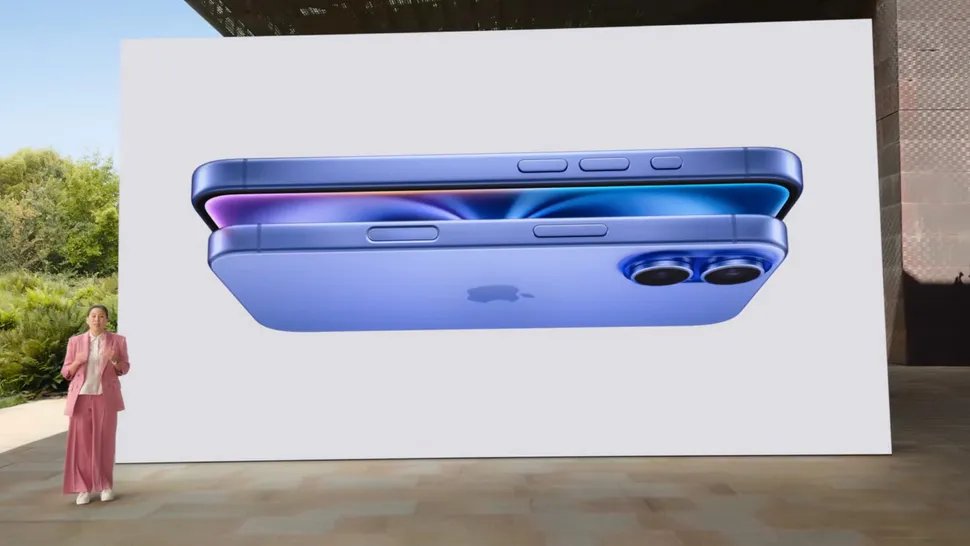
- iPhone 16 Plus gets Action button from last year's Pro models
- Users can assign simple features or complex custom shortcuts
The iPhone 16 and iPhone 16 Plus both inherit the Action button from last year's iPhone 15 Pro and iPhone 15 Pro Max. The Action button replaces the mute switch that's been on every base iPhone since the first iPhone in 2007.
In the settings, users can assign the Action button to one of several custom functions or shortcuts, such as turning on the flashlight, changing focus mode, or opening the camera. You can still use it as a mute switch if you prefer.
Bright and beautiful screen
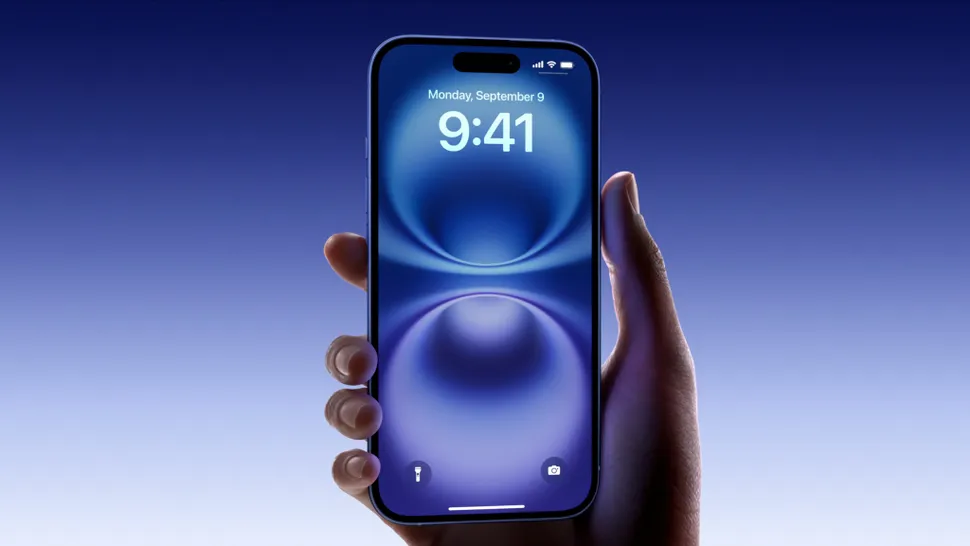
- 6.7-inch Super Retina XDR OLED display
- Resolution 2796 x 1290
- Outdoor brightness max 2,000 nits; typical peak brightness is 1,000 nits
- Can dim down to 1 nit
The display on the iPhone 16 Plus appears to be identical to the one on last year's iPhone 15 Plus, save for one very minor tweak. Like its predecessor, the iPhone 16 Plus comes with a 6.7-inch Super Retina XDR OLED display with a resolution of 2796 x 1290 and a refresh rate of 60hz.
The display supports the P3 color gamut, has a contrast ratio of 2,000,000:1, and a maximum outdoor brightness of 2,000 nits. Maximum indoor brightness is set at 1,000 nits. The only visible difference between this display and last year's display is that the iPhone 16 Plus can reach a minimum brightness of 1 nit.
It's also the same great panel that's been fitted to the iPhone 15 Plus – albeit without the high refresh rate.
Camera upgraded
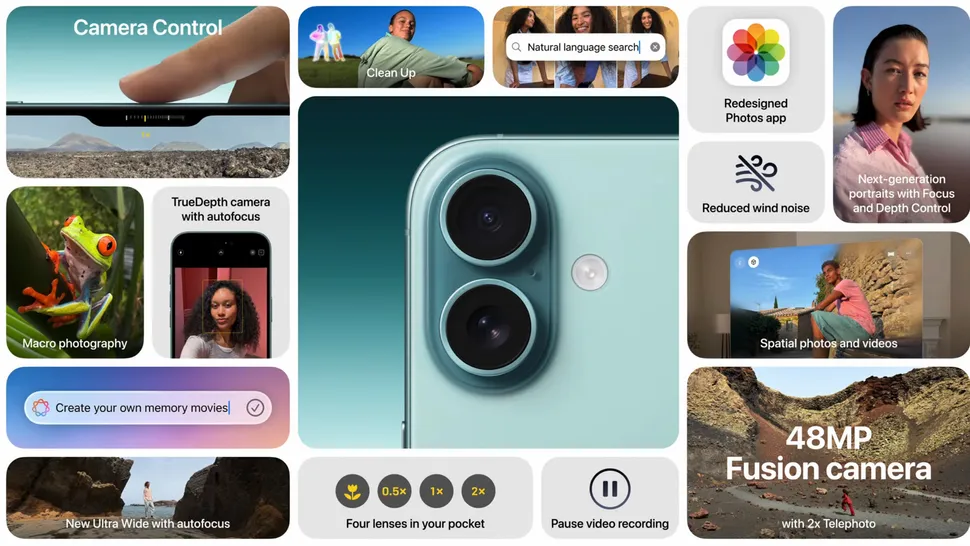
- Apple now calls the main camera on the iPhone 16 Plus the Fusion Camera
- Fusion Camera has a 48MP sensor and ƒ/1.6 aperture with a focal length of 26mm
- The second camera is a 12MP ultra-wide-angle camera with an ƒ/2.4 aperture and a 13mm focal length.
- Apple says the Fusion Camera is capable of 2x telephoto zoom, although it's actually just a crop of the middle 12 megapixels in a 48MP frame
The iPhone 16 Plus features a major design change with the camera system, returning to a vertical layout not seen since the iPhone 12 and ditching the square camera bump found on every major iPhone since the iPhone 11.
The iPhone 16 Plus has a 48MP main camera, which Apple calls the Fusion Camera, which achieves a 2x telephoto effect by cropping into the 12MP portion of the camera sensor in the middle. The second camera is a 12MP ultra-wide-angle camera with a 120° field of view. The main camera is capable of 10x digital zoom.
Aside from the layout change, these cameras are pretty much the same as last year's – but it's that vertical alignment that opens up a whole new feature. Thanks to the new camera layout, the iPhone 16 Plus can shoot 3D photos and videos via Spatial Capture.
This is the same format used by the Vision Pro glasses, which suggests Apple is starting to bring the iPhone and Vision Pro into each other's orbit.
A18 Chipset
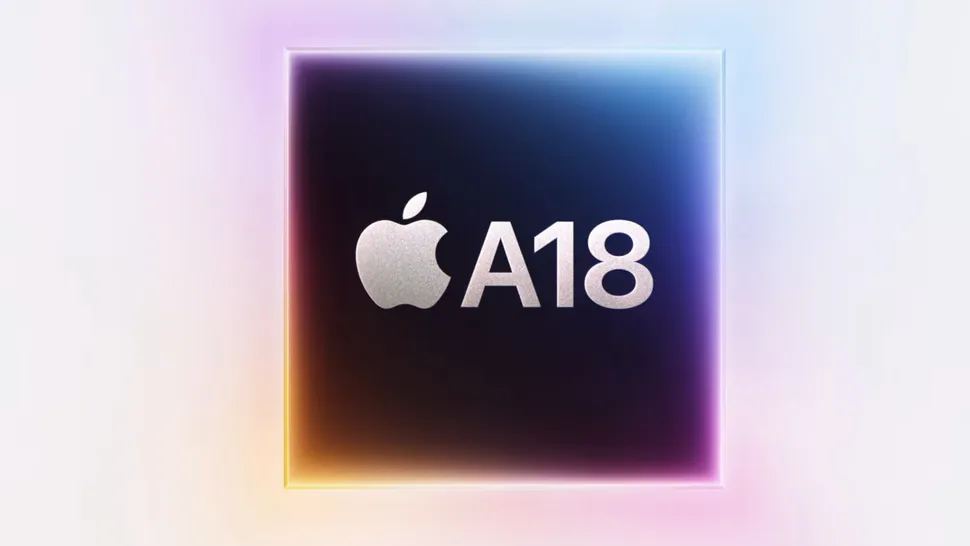
- The A18 chipset replaces the A16 Bionic found in the iPhone 15 Plus
- Apple claims the new chipset has a 30% faster CPU and 40% faster GPU
The A18 chipset in the iPhone 16 and iPhone 16 Plus brings some big performance improvements. The A18 includes a 6-core CPU, 5-core GPU, and a 16-core Neural Engine for Machine Learning and AI processing.
As usual, Apple doesn't provide a benchmark or testing methodology for its performance claims, but Apple says the A18 offers 30 percent faster CPU and 40 percent faster GPU performance than the previous generation.
The A18's GPU also supports hardware-accelerated Ray Tracing, a lighting method increasingly used in modern games. And the A18 chipset includes 'Secure Exclave', which helps ensure the camera and microphone indicators aren't disabled by malicious apps.
As for battery life, Apple never shares the exact battery capacity of any of its products. However, the company claims that the iPhone 16 Plus can last for 27 hours of video playback or 100 hours of audio playback, which puts the battery life between the iPhone 16 Pro and iPhone 16 Pro Max.
It looks like the iPhone 16 Plus will charge at up to 45W, which is a big step up from last year, while wireless charging only maxed out at 25W.
Apple Intelligence
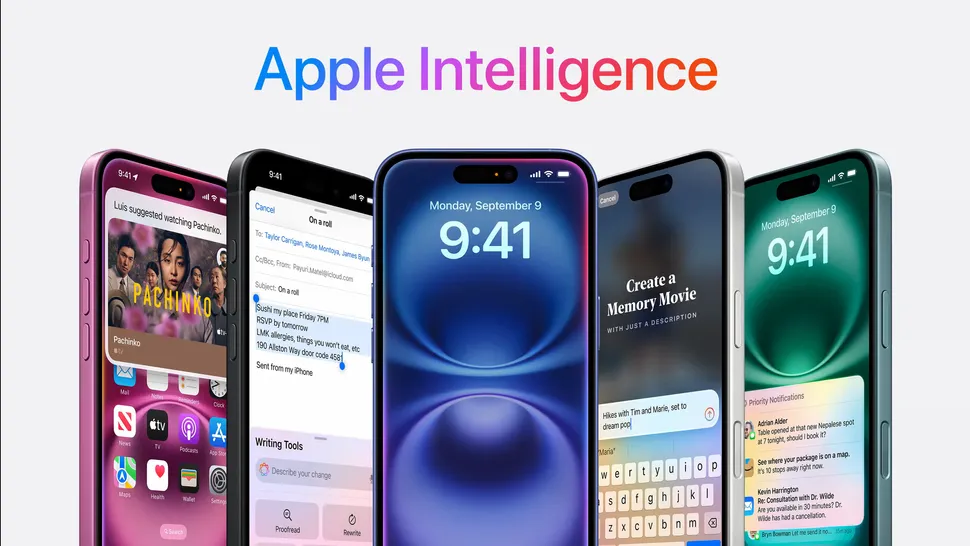
- Apple Intelligence Coming to iPhone 16 Plus in October, with More Features in the Following Months
- The iPhone 16 lineup will be powered by new AI tools, but not at launch
On the software side, AI leads the way when it comes to notable upgrades to this year's iPhone lineup. Apple Intelligence won't be available at launch, but a new suite of AI features will be available on the iPhone 16, iPhone 16 Plus, iPhone 16 Pro, and iPhone 16 Pro Max as a free update.
Apple Intelligence will begin rolling out in beta in October, before a full release in December. Apple Intelligence features include text summarization and rewriting, audio transcription including phone calls, and prioritizing notifications with AI-generated summaries.
Other features that will roll out in stages include generative image creation, generative emoji creation called Genmoji, and a screen-aware Siri that can complete complex commands across a variety of apps. Siri will also have access to ChatGPT, and you'll be able to type messages to Apple's personal assistant instead of relying on voice recognition.